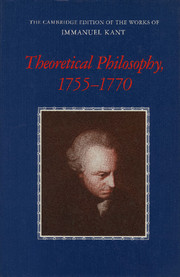Book contents
- Frontmatter
- Contents
- General editors' preface
- Preface
- Guide to abbreviations
- General introduction
- Introductions to the translations
- Résumés of the works
- A NEW ELUCIDATION OF THE FIRST PRINCIPLES OF METAPHYSICAL COGNITION (1755)
- THE EMPLOYMENT IN NATURAL PHILOSOPHY OF METAPHYSICS COMBINED WITH GEOMETRY, OF WHICH SAMPLE I CONTAINS THE PHYSICAL MONADOLOGY (1756)
- AN ATTEMPT AT SOME REFLECTIONS ON OPTIMISM (1759)
- THE FALSE SUBTLETY OF THE FOUR SYLLOGISTIC FIGURES (1762)
- THE ONLY POSSIBLE ARGUMENT IN SUPPORT OF A DEMONSTRATION OF THE EXISTENCE OF GOD (1763)
- ATTEMPT TO INTRODUCE THE CONCEPT OF NEGATIVE MAGNITUDES INTO PHILOSOPHY (1763)
- INQUIRY CONCERNING THE DISTINCTNESS OF THE PRINCIPLES OF NATURAL THEOLOGY AND MORALITY (1764)
- Introduction
- First reflection General comparison of the manner in which certainty is attained in mathematical cognition with the manner in which certainty is attained in philosophical cognition
- Second reflection The only method for attaining the highest possible degree of certainty in metaphysics
- Third reflection On the nature of metaphysical certainty
- Fourth reflection Concerning the distinctness and certainty of which the fundamental principles of natural theology and morality are capable
- Appendix Abridgement of Moses Mendelssohn's prize-winning essay
- M. IMMANUEL KANT'S ANNOUNCEMENT OF THE PROGRAMME OF HIS LECTURES FOR THE WINTER SEMESTER 1765 — 1766 (1765)
- DREAMS OF A SPIRIT-SEER ELUCIDATED BY DREAMS OF METAPHYSICS (1766)
- CONCERNING THE ULTIMATE GROUND OF THE DIFFERENTIATION OF DIRECTIONS IN SPACE (1768)
- ON THE FORM AND PRINCIPLES OF THE SENSIBLE AND THE INTELLIGIBLE WORLD [INAUGURAL DISSERTATION] (1770)
- Factual notes
- Bibliographies of editions and translations
- Glossary
- Biographical-bibliographical sketches of persons mentioned by Kant
- Index
First reflection - General comparison of the manner in which certainty is attained in mathematical cognition with the manner in which certainty is attained in philosophical cognition
Published online by Cambridge University Press: 18 December 2014
- Frontmatter
- Contents
- General editors' preface
- Preface
- Guide to abbreviations
- General introduction
- Introductions to the translations
- Résumés of the works
- A NEW ELUCIDATION OF THE FIRST PRINCIPLES OF METAPHYSICAL COGNITION (1755)
- THE EMPLOYMENT IN NATURAL PHILOSOPHY OF METAPHYSICS COMBINED WITH GEOMETRY, OF WHICH SAMPLE I CONTAINS THE PHYSICAL MONADOLOGY (1756)
- AN ATTEMPT AT SOME REFLECTIONS ON OPTIMISM (1759)
- THE FALSE SUBTLETY OF THE FOUR SYLLOGISTIC FIGURES (1762)
- THE ONLY POSSIBLE ARGUMENT IN SUPPORT OF A DEMONSTRATION OF THE EXISTENCE OF GOD (1763)
- ATTEMPT TO INTRODUCE THE CONCEPT OF NEGATIVE MAGNITUDES INTO PHILOSOPHY (1763)
- INQUIRY CONCERNING THE DISTINCTNESS OF THE PRINCIPLES OF NATURAL THEOLOGY AND MORALITY (1764)
- Introduction
- First reflection General comparison of the manner in which certainty is attained in mathematical cognition with the manner in which certainty is attained in philosophical cognition
- Second reflection The only method for attaining the highest possible degree of certainty in metaphysics
- Third reflection On the nature of metaphysical certainty
- Fourth reflection Concerning the distinctness and certainty of which the fundamental principles of natural theology and morality are capable
- Appendix Abridgement of Moses Mendelssohn's prize-winning essay
- M. IMMANUEL KANT'S ANNOUNCEMENT OF THE PROGRAMME OF HIS LECTURES FOR THE WINTER SEMESTER 1765 — 1766 (1765)
- DREAMS OF A SPIRIT-SEER ELUCIDATED BY DREAMS OF METAPHYSICS (1766)
- CONCERNING THE ULTIMATE GROUND OF THE DIFFERENTIATION OF DIRECTIONS IN SPACE (1768)
- ON THE FORM AND PRINCIPLES OF THE SENSIBLE AND THE INTELLIGIBLE WORLD [INAUGURAL DISSERTATION] (1770)
- Factual notes
- Bibliographies of editions and translations
- Glossary
- Biographical-bibliographical sketches of persons mentioned by Kant
- Index
Summary
§1. MATHEMATICS ARRIVES AT ALL ITS DEFINITIONS SYNTHETICALLY, WHEREAS PHILOSOPHY ARRIVES AT ITS DEFINITIONS ANALYTICALLY
There are two ways in which one can arrive at a general concept: either by the arbitrary combination of concepts, or by separating out that cognition which has been rendered distinct by means of analysis. Mathematics only ever draws up its definitions in the first way. For example, think arbitrarily of four straight lines bounding a plane surface so that the opposite sides are not parallel to each other. Let this figure be called a trapezium. The concept which I am defining is not given prior to the definition itself; on the contrary, it only comes into existence as a result of that definition. Whatever the concept of a cone may ordinarily signify, in mathematics the concept is the product of the arbitrary representation of a right-angled triangle which is rotated on one of its sides. In this and in all other cases the definition obviously comes into being as a result of synthesis.
The situation is entirely different in the case of philosophical definitions. In philosophy, the concept of a thing is always given, albeit confusedly or in an insufficiently determinate fashion. The concept has to be analysed; the characteristic marks which have been separated out and the concept which has been given have to be compared with each other in all kinds of contexts; and this abstract thought must be rendered complete and determinate. For example, everyone has a concept of time. But suppose that that concept has to be defined. The idea of time has to be examined in all kinds of relation if its characteristic marks are to be discovered by means of analysis: different characteristic marks which have been abstracted have to be combined together to see whether they yield an adequate concept; they have to be collated with each other to see whether one characteristic mark does not partly include another within itself.
- Type
- Chapter
- Information
- Theoretical Philosophy, 1755–1770 , pp. 248 - 255Publisher: Cambridge University PressPrint publication year: 1992



